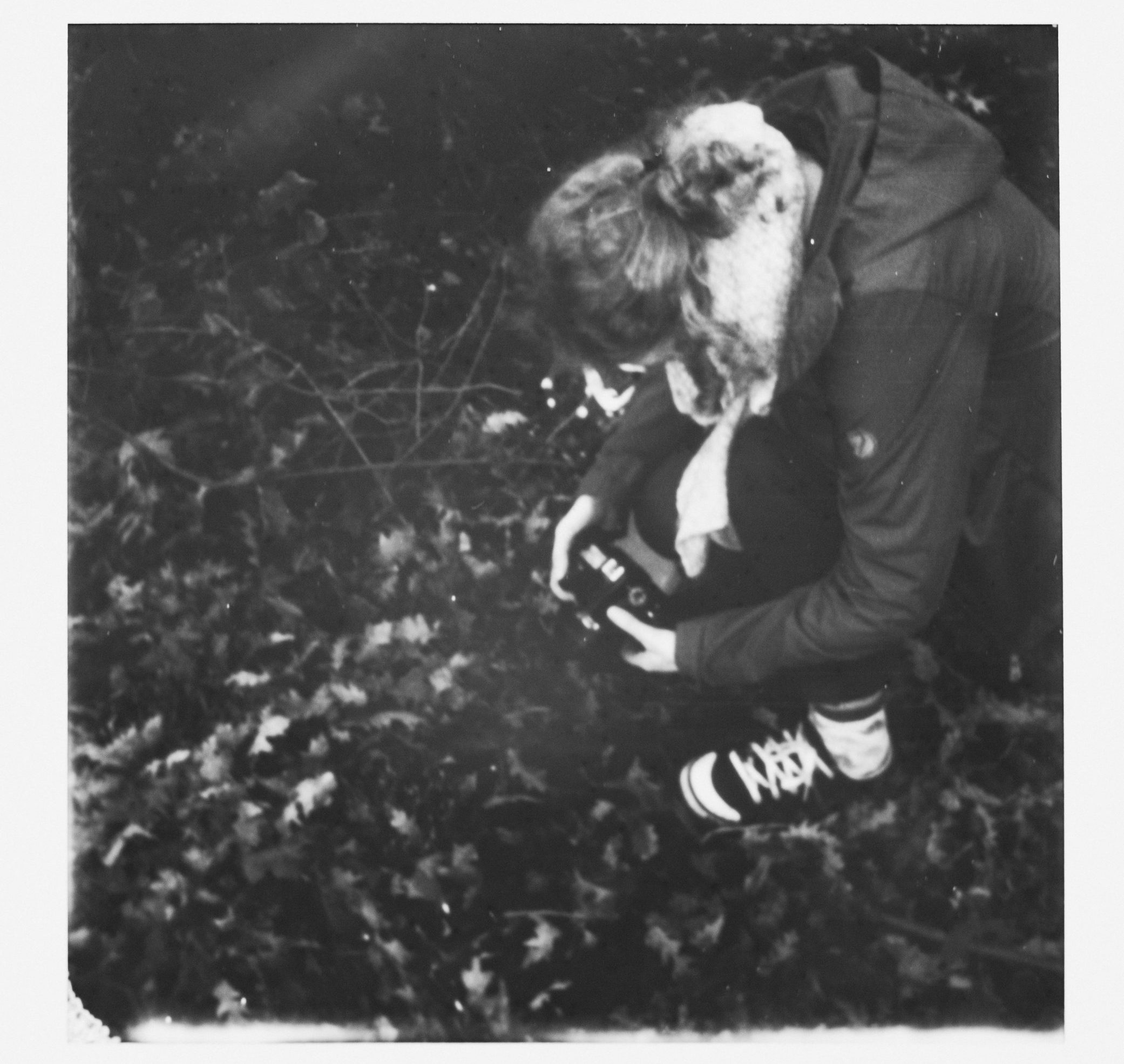essays
What Exactly Does She Think Happens?
An essay by Michael Backus

What Exactly Does She Think Happens?
Karl is cold. His blanket slid off onto the floor and he’s not wearing pants or a shirt, only underwear. Sammy the cat is curled up on the far arm of the davenport, within striking distance of Karl’s feet. Sammy sometimes attacks feet. Karl is pleased to see he’s wearing boots, Red Wing Irish Setters from the looks of them, laces tied in big loopy bows, though he’s less sure why he has no pants or shirt. These boots had been his father’s. As a child, he and his sister Dee would pull them out from under the workbench in the garage. They were so large and heavy, it was all Karl could do to shuffle around the concrete in them, but Dee, two years older and much bigger, wrapped the laces around her ankles so she could walk without stepping out of them. Sometimes she’d get in the boots and he’d stand on the tops of her feet — they both fit easily — and she’d walk him through the house, around the back yard, down the road to the bluff’s edge overlooking the lake. If it was chilly out, she’d open her coat and zip the both of them inside.
His wife Marci looms above him. “Karl, you know I don’t allow boots on the couch.”
“Tell that to him,” Karl says, meaning the cat.
“Where are your pants?” Marci says. “It’s embarrassing.”
You’re embarrassing, Karl thinks.
“Shut up,” he says, meaning something else.
“Karl?”
“You don’t know shit.”
“Don’t say that, Karl.” Her tone is calm, practiced, that of a technician to a troubled customer. It sets him flush, prickly.
“Less than nothing.”
“Don’t say that, Karl.”
He finds a bottle half full of Buffalo Trace Kentucky bourbon on the top shelf of his work bench, he was certain he’d drank it and wonders if maybe he was using it to store something else. He takes a sip, then another, then another, still unsure if it’s whiskey or some other liquid. He’s gotten used to how complicated everything seems now, how even when he’s sure he’s making sense, people treat him the way Marci does — gingerly, like a child. He’s heard her use the word dementia, always whispered, like it’s a secret. He doesn’t care what Marci thinks she knows, he knows things too. He finds a basketball in a thick white cotton bag, the ball clean and smooth and still properly inflated though it’s been 10 years since he stopped playing. His wife likes to tell this story, she seems to take special delight in it. How he’d been playing in his regular 65-and-over three-on-three game, how little Jimmy Rodriguez had the gall to post him up, Jimmy all of 5’7″ and Karl a full nine inches taller, and how Karl used his strength to push Jimmy away from the basket and how Jimmy snapped his head back (to clear space, Karl believes. Out of pure meanness, Marci says), smashing Karl’s nose, causing bleeding into his brain, a single simple action that changed their lives forever.
Or so she claims.
They’ve stopped at a rest area in Kansas, just a flat spot in the grass with a picnic table and a small grove of trees. Otherwise, corn in every direction, fully grown but still green. Karl finds it suffocating, stuck in the back seat with his two remaining sisters, driving through an endless green tunnel. It’s 1936 and they have everything they own in their 1933 Oldsmobile. They’re moving from Indiana to California to start anew because Karl’s mother and father can’t bear living in the same house, the same town, the same state without her. On the edge of a corn field in Kansas, Karl sees what isn’t possible. He sees her, his sister Dee, his best friend in the world, dead three months, standing on the edge of the corn, wearing the same white shorts with a black stripe she’d worn for three summers. The shorts are tight on her, the edges press into her skin. She smiles at him, then she runs and he follows, corn stalks slapping at his face.
Branches against the windshield, slap slap, Karl’s Jeep Grand Cherokee rolls to the bottom of a shallow depression, coming to rest against a juniper bush. He understands something is wrong, his Jeep shouldn’t be here, but he’s not sure how it happened or how to fix it. This happens to him now, he’ll find all the doors to the house open for no reason or the bath running until it overflows or the cat squatting right in the middle of the kitchen and letting loose like Karl isn’t standing two feet away. He opens the door, engine running. Why would they plant trees so close to the supermarket parking lot? And why did Marci take off and leave him with a strange man who keeps leaning over him. His long beard tickles Karl’s bare knee. Karl has his left foot on the ground.
“Now your right.” The man’s voice. He’s clean-shaven, it’s not a beard tickling him but the man’s shirt tail. This makes Karl feel better, like he’s figuring things out. “Your right, sir,” the man says.
Karl puts his right foot on the ground.
“Wait, no, leave your left foot out.”
He puts his left foot on the ground.
“Sir, no…sir…”
Yesterday, he got up at dawn and found coyote tracks in the snow outside his bedroom window, worn through to the red New Mexico dirt, and he imagined coyotes coming together to watch him sleep. Last week, men in brightly colored wool coats appeared in his back yard, waking him from a nap. They drank coffee from an aluminum thermos and pointed here and there and laughed like he wasn’t in plain sight in his own bed with bright sunlight stretching across his bare legs. “Left foot to the ground first,” one said. “Right foot next.”
“Left foot first,” the other agreed.
He is standing in his bedroom at his chest of drawers, there’s a smell in the air. Are the piñon forests around Santa Fe burning again? His wife Marci is quiet in the living room, a good sign, except he’s also holding a pistol — the Colt .45 semi-automatic — my pistol, he thinks, and then laughs because he’s standing in his bedroom holding his pistol. HIS PISTOL.
He raises the barrel to his nose. Recently fired. His father used to pick up spent shotgun shells in the field and sniff them, passing them to Karl. “Fired earlier this morning,” he might say. Or, “Last winter.” Marci chooses this moment to enter, sees the gun at his nose, and screams. Silly woman. She thinks he means himself harm and he wants to tell her about his father and the smell of a freshly fired shotgun shell and how he taught his son, their son Pete, the same thing, but now is not the time and she’s not screaming at him exactly but at the spot in the floor where the round went in, a small black circle in the white carpet. Of course she’s over-reacting, what exactly does she think happens when you fire a .45 caliber round into the floor anyway? You get a hole, you get a powder mark.
He wakes to breathing; the shallow panting of a dog? He’s on the couch in the dark. Marci snores in the bedroom. A coyote sits outside the patio doors, looking in. Just a thin sheet of glass between Karl and the animal. He sits up, left foot first, then right, and turns on the table lamp. Sammy the cat is on the back of the couch, eyes blinking in the light, purring. Karl’s .45 is in the bedroom and no good can come from waking his wife. He lumbers down the hall to the spare room where he keeps his .357 single action revolver in a gunfighter-type leather holster and belt hanging from a hook inside the closet. He straps it on and ties down the leather lace just above his knee to keep the holster from flopping about. The leather is cool on his skin. Only then does he realize he’s in his underwear. He knows he should put on pants but they’re in the bedroom. Instead, he pulls on the heaviest coat in the closet, a medium weight Carhartt, and slips out the side door.
The air is crisp, the snow squeaks underfoot. The boots are excellent luck. It turns out he had a plan from the start, wearing these boots all day, there was a reason. He wishes Marci was awake to see he isn’t quite as doddering as she imagines, then laughs and laughs because of how ridiculous he would look to her. A grown man outside in the bitter cold in his underwear, wearing a holster with a fully loaded pistol.
A pack of coyotes in full bloodlust kicks up, howling and barking and yapping, but far away. It still has the power to chill the blood, being outside with nothing between him and animals on the hunt. Karl slowly pulls the revolver, thumb on the hammer. He shines the flashlight out across the valley. His father had taught him this, how to catch an animal’s eyes with a light in the dark. They hunted frogs at night on country roads after a rain with a flashlight and a net, looking for shining eyes in the weeds along the roadside. He walks straight until he hits what appears to be a set of fresh coyote tracks. He follows them with the flashlight, stopping every few feet to listen.
Karl pulls to the side of Cerrillos Road because a square of sky has ignited into a fiery red, a rain squall less than a mile wide hanging above the swath of aspens on the side of the mountain, the lowering sun catching it just right. He gets out, leans over the hood, pinches the storm between his thumb and his forefinger, an entire section of the world in his hands, and as he watches, the color slowly leaks away.








